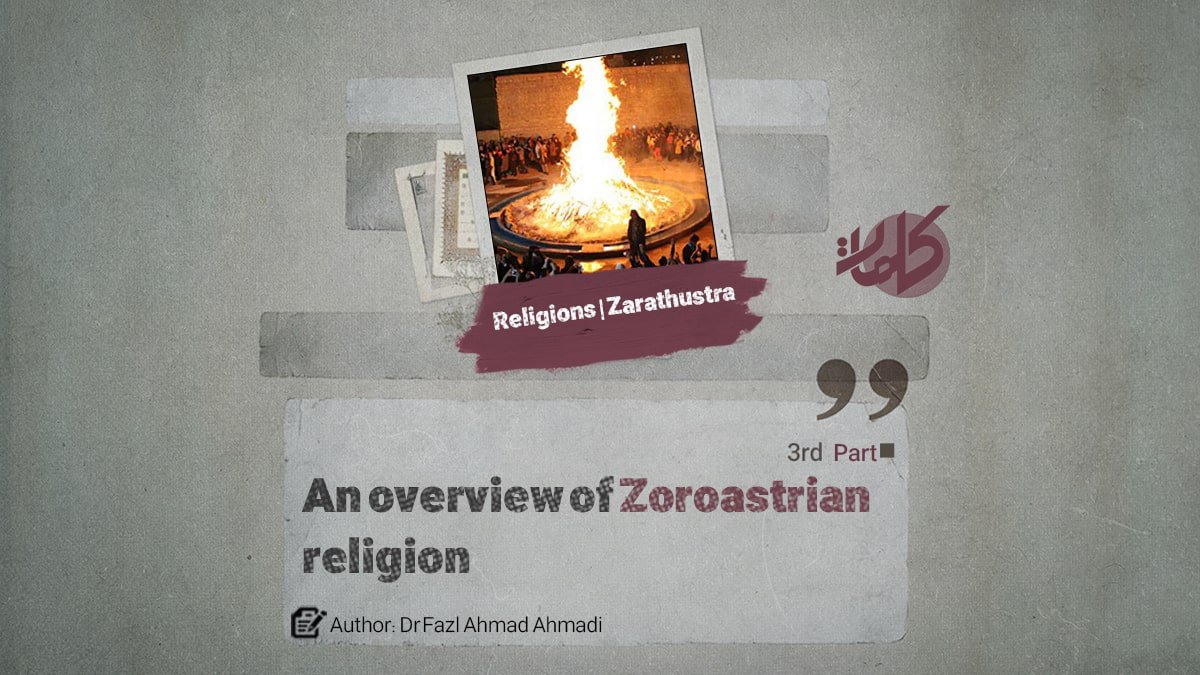
Author: Dr. Fazl Ahmad Ahmadi
An Overview of the Zoroastrian Religion (3rd Part)
2- Universal or Ethnic Mission of the Zoroastrian Religion
The question of whether Zoroastrianism was a universal religion or one limited to a single tribe is a fundamental debate in religious research in the field of Zoroastrian studies. In general, two entirely different viewpoints proposed: his case: the first view is that Zoroastrianism is universal, and its mission encompasses all of humanity. According to the religious texts of Zoroastrians, two passages from these texts can be interpreted as possible confirmation of this view. The second viewpoint considers Zoroastrianism as an ethnic and non-universal religion, and two points are mentioned in this context.
1-2 Zoroastrian’s global mission
1-1-2 Zarathustra’s mission in Gahan
As mentioned, there are different views about Zoroastrian religion. Some people are of the opinion that the heavenly message of the prophet of Iran was not addressed to specific people and specific land, rather, Zoroaster’s “Esho” message is addressed to all human beings and belongs to any time, any place and any weather. Therefore, Zoroaster’s words are not limited to certain limits; As it is stated in paragraphs 30 and 2 of the first “Ghats” as follows: “Listen to more valuable words, look at it with a clear mind, distinguish between these two religions (falsehood and truth), before the Last Day (Judgment), when it comes, everyone chooses his own religion, so that we can be successful in the end”.
It is well known among Zoroastrians and Zoroastrian scholars that only a small part of Avesta is attributed to Zoroastrian, which is called “Gahan” or “Gatha”, and Zoroastrians consider only this part as heavenly and divine revelation, other Avesta texts, although they are sacred to Zoroastrians, but they are not heavenly and are the words of Zoroastrian saints in the past centuries. By searching in Gahan, no clause or clauses have been found that specify or appear in the universality of Zoroaster ‘s invitation. But the only thing worth pondering is the third paragraph of part 95 Gahan, under which it somehow refers to the universality of Zoroastrianism:
“O Mazda, with your words and with your language, you will grant us the knowledge of what you have promised to both groups of your Minos, Azar and Ashe, and of the prosperity that comes with your help, and of the command that the righteous sages, until I call all people to convert [to your religion].”
“Lord, what will you give us in the light of Minos light?” What is the happiness that is obtained in the light of truth and purity, and which is promised to everyone? What is the command given about wise men? O God, make my wisdom aware of all these truths and enlighten me with your inspiring speech so that I can guide all people to the true religion.”
Azarghashsb writes in the commentary of this section: “At the end of the second and third lines, Zoroaster wishes to understand these truths through God’s revelation and inspiration so that he can guide people to the right path and monotheism and introduce them to the true religion and guide them.” This paragraph shows that Zoroaster called people to religion and guided them to the right path and monotheism with his earnestness and tireless efforts. Also, this paragraph shows that the propagation and guidance in Zoroastrian religion has been very prosperous unlike today, and entering Zoroastrian religion has been completely free”.
1-2 Zoroastrian Religion and mission
By examining the Pahlavi texts, there is a clause in the fifth Religion that expresses the universality of Zoroastrian mission. This Pahlavi text, which includes questions and answers, is stated in the 14th question and its answer: “Why did Allah send religion only to Iranshahr and leave other people to worship evils?” Does Allah not consider others worthy or is it that he cannot show them the religion?”
In response to this question, it is stated: “And the creatures of Urmuzd sent this religion not only in Iranshahr, but to the whole world and to every race, and it has spread all over the world in a pure form and in a mixture somewhere; In a Minoan way in natural knowledge, right thinking and right speaking, and in a Getite way in right speaking”.
2-2 Zarathustra’s limited mission
The second point of view, which expresses the limited mission of Zoroastrianism, also presents some evidence. The evidence of this claim is:
1-2-2 what is cited about the limited mission of Zoroastrianism is the emphasis on ethnicity and race in Zoroastrianism. “Mistry”, the Zoroastrian scholar, divides religions into classical religions and romantic religions. In classical religions, ethnicity is very important and a person must be born in the same religion to be considered good. Ethnicity is like an identification card and a person needs this card to be a member of that religion. Therefore, racial identity is the most important characteristic of classical religions. Judaism, Zoroastrianism and Hinduism are among the classical religions. Islam and Christianity are romantic religions. In romantic religions, racial identity is not important. A person can be from India, Europe, South America or anywhere else and become Christian or Muslim.
one of the other major debates in the context of the limitations of Zoroastrianism is the fact that this religion is not preachy. While in religions with a global mission, Da’wah and propaganda have a lofty position and an important pillar. Zoroastrians never had a good opinion about attracting others to their religion and did not make any efforts to promote it. Miladi, the traditional association of Zoroastrian elders stood stubbornly against inviting others or accepting followers of other religions into Zoroastrian religion and did not accept them into their class. Therefore, the Zoroastrian religion is not a religion of preaching and calling; rather, its scholars, like the Jews, have never invited others to Zoroastrianism either because of self-conceit or because of jealousy.
Continues…


